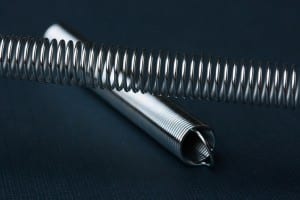 Specialized metals are used in the fabrication of springs and wire forms when certain physical, chemical, and mechanical properties are required for an application. Though specialized metals may refer to a specific metal, in general, as a material choice, they often refer to a range of metal alloys that hold the desirable characteristics needed for a specific purpose, such as strength, durability or conductivity. But they may also need to function under specific conditions like harsh or corrosive environments or in a broad temperature range. Featured here are five prominent specialized metals that James Spring and Wire Company use for custom spring and wire form applications:
Specialized metals are used in the fabrication of springs and wire forms when certain physical, chemical, and mechanical properties are required for an application. Though specialized metals may refer to a specific metal, in general, as a material choice, they often refer to a range of metal alloys that hold the desirable characteristics needed for a specific purpose, such as strength, durability or conductivity. But they may also need to function under specific conditions like harsh or corrosive environments or in a broad temperature range. Featured here are five prominent specialized metals that James Spring and Wire Company use for custom spring and wire form applications:
Chrome Silicon
As the name suggests, chrome silicon is a chromium-silicon based, high strength, steel alloy. Known for its resilience in higher temperatures and its high tensile strength, chrome silicon is a choice material used in the fabrication of springs and wire forms. Cold drawn and heat treated, the material is extremely strong and durable. Due to its high degree of malleable strength and durability, chrome silicon is able to withstand the demanding shock loads and high stress of rapid and repeated spring loads over long periods of time without hindering the application performance. The material is commonly used in valve springs and automatic transmissions where temperatures can exceed 275 degrees Fahrenheit. It’s also used in aerospace applications and for general industrial springs.
Phosphor Bronze
As a type of bronze, phosphor bronze is a copper alloy, with anywhere from 0.5 to 11% tin, and 0.01 to 0.35 % phosphorus added, depending on the application requirements. The greater amount of tin, the better corrosion resistance and strength the material offers. As a highly-valuable specialty metal, the material is strong and easily molded. Its resistance to chemical corrosion, wear, and tarnishing, combined with its fatigue resistance, make phosphor bronze an ideal spring and wire material for applications in caustic environments. A spring made of phosphor bronze can withstand repetitive motion while still retaining its shape through many cycles of loading. It is ideal for springs designed to endure medium or low impact. The material is often used to fabricate larger springs in industrial machinery, electrical wire forms, and wire strings for musical instruments.
Copper
Though copper is often alloyed with other metals such as zinc, to make brass, or, the aforementioned tin, to make bronze, on its own, copper too is a specialty metal used in the fabrication of springs and wire. As a spring material, copper has many favorable properties that make it desirable for certain applications. The material is highly ductile and is easily worked. It’s not the strongest metal, but it is tough, durable, and has good strength. Copper is well-known for its high thermal properties and electrical conductivity, and is widely used for electronic and electrical component materials in mobile phones, computers, and electrical wiring. Copper also holds antibacterial properties.Those hygienic properties make it ideal for springs and wire forms used for component parts in medical devices and equipment. Finally, a non-ferrous metal, copper holds no magnetic properties. When combined with its resistance to corrosion, copper is an ideal material for spring applications in industrial machinery and engines, and for applications in humid, marine, and low temperature environments.
Inconel
Inconel is actually the trademark name of a family of high-performance, nickel-based alloys featuring multiple grades for use in specific applications. Developed by Special Metals Corporation, Inconel was designed to perform in extremely corrosive environments at elevated temperatures. Its thick and stable oxide layer also provides creep resistance necessary in caustic, high temperature applications. Inconel is an ideal choice for use in gas turbines, chemical processing, industrial heating, nuclear, and heat treating applications, to name a few.
Hastelloy
Hastelloy is the name of another trademarked, corrosion-resistant nickel-based alloy. It too is available in many grades optimized to meet specific application requirements. Its high temperature resistance and exceptional corrosion resistance is achieved primarily by adding high quantities of chromium and molybdenum. As a material, Hastelloy is ductile, has good weldability, and can be easily fabricated and formed. It offers resistance to oxidizing agents and acids, but its outstanding corrosion resistance is what makes the material a great choice for spring and wire form applications in any moderate to severe corrosive environments. In that regard, Hastelloy springs are commonly used as components in the oil and gas industries, chemical and petrochemical industries, and nuclear industries.
At James Spring and Wire Company, we utilize specialized metals in the design and manufacture of custom springs for OEM products around the world. We have consistently and successfully partnered with fabricators, engineers, and design firms alike to ensure their component material holds the necessary properties to function as designed in their application. For more information on how we can meet your design needs and manufacture the best spring for your application, contact James Spring and Wire today.

